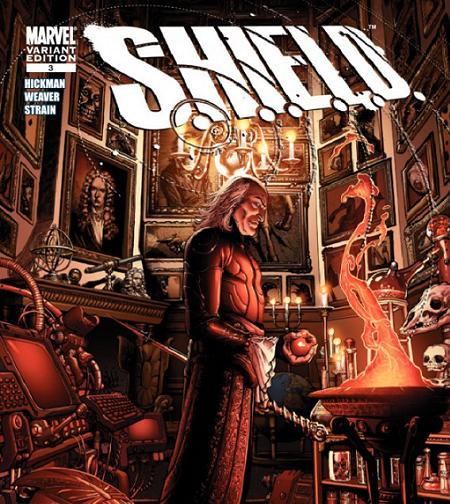Images & Words – S.H.I.E.L.D. #3
[images & words is the comic book pick-of-the-week at OL. equal parts review and diatribe, the post highlights the most memorable/infuriating/entertaining book released that wednesday]
Spoilers Ahead. Forreal.
I believe in ideas.
I’m not religious. I don’t belong to a political party. And I’m generally weary of aligning myself with institutions. But what I am unabashedly interested in is the formation, exploration, and discussion of ideas. Anything that has or can or will be done has come about by the processing of thought. Mental exertion. Trying to conjure up something that has yet to be plucked out of the nebulous pool that is the collective unconscious.
Human beings are squishy blots of flesh that exchange fluids with the world and rarely last one hundred years. They are fragile and gross and quite often unhinged mentally. And yet, within the few protective millimeters of skull is the capacity for goddamn anything.
Penicillin. Films. Sexual fetishism. Hospitals. Education. Genetic manipulation. Geoengineering. A hilarious anecdote about a dead relative. Cloned organs. Terraforming. Dinner reservations for two, no wait, three. Interstellar travel.
It’s all in there, in the goddamn ideaspace. The realized and unrealized. The real and the fictional and the grey area where the two meet for conjugal visits.
S.H.I.E.L.D. is a comic book about these conjugal visits.
I truly believe that in twenty or thirty years, S.H.I.E.L.D. is going to be discussed with a reverence that today’s creators reserve for folks like Jack Kirby and Alan Moore. The story takes some of the staples of the Marvel universe and bends them to fit its more universal aim. Through this third issue, the comic book is encouraging the reader to ask the question, “What do we do when all seems lost?”
Of course, this question is all the more palatable when projected through the lens of the 616.
S.H.I.E.L.D. isn’t just an organization of superheroics run by a pirate. It is an ancient fraternity of the world’s greatest thinkers, from Imhotep to Leonardo da Vinci to Galileo, dedicated to preventing the end of the world. To stave off the end times, confrontations with Galactus are necessary.
But as written by Hickman, Galactus isn’t just the devourer of worlds. Instead, he is viewed as the impending obliteration of all possibilitiy. Fortunately, the human race is able to defend itself against this destructive power despite its inferiority. What is used, in the absence of physical prowess, is the combination of thought and action.
The actualization of the goddamn mind.
In the Rome of 1582, we see Galileo leading a maneuver against Galactus. All of SHIELD’s men have attached themselves (specifically, their minds) to a defensive mechanism (it looks like a sick lazer-beam). However, Galileo still worries that it will not work. Fortunately, his concerns are appeased during an exchange with The Second Man.
The Second Man: Yes, of course, this intermediary device that I have constructed will provide a cleaner conversion from potential to actuality…and yes, it will, hopefully, minimize the drain to a more acceptable level.
Galileo: But are we not still human and therefore incapable of such feats?
The Second Man: That’s the necessity of the engine…There must be a mechanism to align soul, mind, and body. A machine to focus man. With that, Galileo, there is nothing that can’t be done.”
Cleverly, this battle with Galactus is credited as being the real reason as to why ten days were skipped when the Gregorian Calendar was implemented. A letter from Pope Gregory XIII to Galileo ends;
Effective immediately, in the year 1582 AD, the last day of the Julian Calendar was Thursday, October 4th, and the first day of the Gregorian Calendar was Friday, October 14th. All references to anything that happened during these dates is, from this day forward, forbidden.
To be clear, let history show that these ten days…never happened.
Ha!
Also shown in this issue is Isaac Newton’s ascension to the top of S.H.I.E.L.D. However, Newton’s path is depicted as being wretched and marred by moral compromises — his thirst for knowledge knows no boundaries. The intellectual finds himself traveling to the strange Deviant City, mating with one of the indigenous creatures and suffering the “corruption of their beliefs” in his never-ending quest.
By the end of the issue, Newton has mastered the Five Fold Understanding (Greater Science, Hidden Arts, Secret Alchemy, Quiet Math, Silent Truth). Unfortunately, the physicist is worse for the wear and has now been revealed as a villain!
S.H.I.E.L.D. #3 (and the series as a whole), works fine on a surface reading. Sure, it could be read as a kooky reimagining of Earth’s greatest intellectuals as warriors in a planetary struggle. That’s cool and I honestly enjoy that.
But this comic book truly succeeds because it pushes the envelope of thought itself. What can we do if we put our minds to it? Can we go too far? What are the costs of pursuing excellence?
I’m telling you, S.H.I.E.L.D. is going to be one of those comic books people talk about for years. Get on board.




